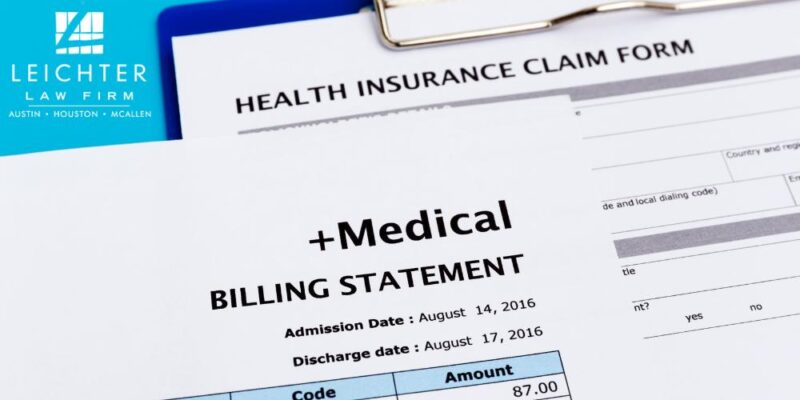Medicaid and Health Care Fraud Attorneys in Austin and Houston, TX
Are You a Medical Professional Facing Health Care Fraud Charges in Texas?

The government dedicates a considerable amount of resources to the investigation and prosecution of Medicaid fraud. Unfortunately, this causes many healthcare providers to be subjected to investigations relating to small billing errors or minor discrepancies. The Medicaid and health care fraud attorneys at Leichter Law have helped many medical professionals in the Austin and Houston, Texas areas, as well as across the United States.
Our attorneys have considerable experience representing physicians and other healthcare professionals when they are accused of or charged with healthcare fraud. These allegations are extremely serious, and those involved should contact an attorney as soon as possible. To have the best possible chance of protecting your license, livelihood, and future, working with an experienced healthcare fraud defense lawyer is your best bet.
Qualified Medicaid and Health Care Fraud Attorneys
According to the U.S. Government Accountability Office, about $1 out of every $7 to Medicare is lost due to insurance fraud and abuse. As a whole, insurance fraud may involve up to $100 billion in stolen funds each year. Because of the widespread nature of the problem, charges of fraud and abuse against physicians and other healthcare providers can have serious consequences. They have also become much more frequent.
If you have been charged with health insurance fraud and now face the risk of losing your professional license, the Texas professional license defense lawyers at the Leichter Law Firm have the knowledge and experience you need to help you build the strongest defense possible. Contact our offices today at 512-495-9995 to discuss your situation.
What Does a Medicaid Fraud Attorney Do?
A Medicaid fraud attorney assists physicians and healthcare professionals when a complaint has been filed against them, whether by a patient, whistleblower, or another internal agency discrepancy. The difference between a regular criminal defense attorney and one who handles healthcare and Medicaid fraud allegations is that the latter fully understands the possible implications on your career.
Not only could you face criminal penalties, but also penalties against your license or professional career. The average criminal defense lawyer likely won’t take these factors into consideration, as they mainly focus on the criminal implications of a charge or conviction. The attorneys at Leichter Law, however, have experience in both criminal and administrative law, which is crucial in these cases. We have what it takes to protect your personal and professional interests.
What Is Healthcare Fraud?
Healthcare fraud involves deliberately deceitful actions in the healthcare industry that result in undeserved financial gain for a healthcare provider, patient, or other party. In this context, fraud is closely related with healthcare abuse, which involves actions that do not align with the accepted business, medical, or financial practices.
These practices take many forms, including illegal billing practices, embezzlement, Home Health Care fraud, Medicare fraud, Medicaid fraud, and more. Because of the impact that widespread fraud would have on consumers, the Federal Government is aggressive in its investigation and prosecution of these cases.
Unfortunately, this aggressive approach has led to indictments on weak charges with less evidence, which has led to more expensive trials. This is why working with experienced healthcare fraud defense attorneys is a must.
What Are the Elements of Healthcare Fraud?
In order to convict someone based on healthcare fraud, the government must prove the following elements beyond a reasonable doubt. The defendant:
- Knowingly,
- Willfully,
- Devised a scheme to defraud a healthcare program,
- And executed that scheme.
The government must prove all four elements beyond a reasonable doubt. Therefore, your defense attorney’s goal will be to either have the case dismissed or to show a jury that the prosecution cannot prove health care fraud beyond a reasonable doubt.
What Laws Apply to Healthcare Fraud Cases?
In an effort to cut back on fraud, abuse, and waste, the federal government has ramped up its focus on healthcare fraud investigation and enforcement. Both state and federal governments have laws that outline criminal and civil penalties for healthcare fraud, Medicaid fraud, and Medicare fraud.
While most laws that apply to these cases are federal laws, both federal and state laws apply in Texas. Below, we outline the most influential federal and state laws that relate to healthcare fraud and abuse.
False Claims Act
Also known as the “Lincoln Law,” the False Claims Act is a law relating to whistleblowers. It allows private citizens who bring successful claims against entities that defraud the government to receive 10-30% of the total recovery. Those who file claims under the Act also receive whistleblower protections against retaliation by an employer.
Common False Claims Act violations include the following.
- Using false statements to have a claim paid
- Presenting false claims for payments
- Failing to return overpayments to the government and other reverse false claims
Stark Law
Also known as the Physician Self-Referral Law, the Stark Law makes it illegal for medical providers to refer patients to entities with which they or their family members have a financial interest. Specifically, it is illegal to refer patients for twelve designated health services (DHS). These twelve services are as follows.
- Occupational therapy
- Clinical lab services
- Physical therapy
- Home health
- Radiology services
- Durable medical equipment and other supplies
- Radiation therapy
- Orthotics, prosthetics, and related supplies
- Outpatient prescription drugs
- Hospital services
- Outpatient speech-language and pathology
- Parenteral and enteral nutrients and related supplies
Anti-Kickback Statute
Kickbacks are payments made to someone who promoted appointments or transactions. The Anti-Kickback Statute (AKS) prohibits either accepting or offering kickbacks that intend to generate more healthcare business. Violations of the AKS can also trigger penalties for violations of the False Claims Act.
Health Care Fraud Statute
The federal Health Care Fraud Statute is the federal law that specifically makes healthcare fraud a criminal offense. It outlines the penalties for healthcare fraud and abuse as imprisonment for up to 10 years and criminal fines of up to $250,000. Notably, specific intent is not required for a conviction under this statute.
Controlled Substances Act
The Controlled Substances Act (CSA) establishes regulations regarding the possession, use, manufacture, importation, and distribution of controlled substances. Regarding healthcare fraud, the CSA applies to situations involving improperly prescribed narcotics.
Texas Medicaid Fraud Prevention Act
The Texas Medicaid Fraud Prevention Act (TMFPA) allows whistleblowers to file claims against those who engage in conduct intended to defraud the government in Texas. The TMFPA aims to combat healthcare fraud and Medicaid fraud in the state. It also protects whistleblowers from retaliation by their employers.
Who Investigates Healthcare Fraud?
One of the primary federal agencies that investigates health care fraud is the Federal Bureau of Investigation (FBI). The FBI also partners with other federal, state, and local agencies in their investigation and enforcement of healthcare fraud. Other investigators of healthcare fraud can include the Texas Attorney General’s Medicaid Fraud Control Unit, the Healthcare Fraud Prevention Partnership, certain insurance groups, and the Texas Department of Health and Human Services.
This is not an exhaustive list of all parties or agencies that may be involved in a particular healthcare fraud investigation. Depending on the facts of the case, as well as the jurisdiction, other parties may be involved in investigating false or fraudulent claims.
Common Issues in Healthcare Fraud Investigations
When fraud and false claims affect state or federal healthcare programs, this can trigger aggressive targeting of healthcare providers with audits and investigations. Although the purpose is to prevent waste and protect citizens, these aggressive actions have often resulted in simple errors or mistakes negatively impacting medical providers and practices.
If your business or practice is the target of a healthcare or Medicaid fraud investigator, you may wonder what exactly they are looking for. Generally, they are looking for any and all possible evidence of fraud or abuse. Because of the high level of risk and the harsh potential penalties, strongly suggest working with an attorney if you are being investigated. Even if you did not commit healthcare fraud in any capacity, it is in your best interest to legally protect yourself.
Some of the most common issues in healthcare fraud audits and investigations are as follows.
- Violations of telemedicine regulations
- Lack of medical necessity according to federal healthcare benefit programs
- Illegal referrals, marketing contracts, or consults
- Misclassifying independent contractors or employees
- Missing or insufficient documentation
- Medical coding and billing errors
- Lack of comprehensive compliance programs
- Financial conflicts of interest that affect providers’ decisions about medical care
Other issues exist that could trigger civil and criminal penalties for healthcare fraud, so the above list is not exhaustive. If you are unsure if you have been exposed to those potential penalties, contact our Texas healthcare fraud defense attorneys as soon as possible. We will evaluate the facts of your situation and advise you of the best course of action.
How Far Back Can Medicaid Audits Go?
Individual states determine how much Medicaid will be paid, usually on a contingency fee basis. In an audit or Medicaid fraud investigation, claims can be reviewed up to four years after the date they were filed, according to Texas’s Self-Disclosure Protocol. However, depending on the Medicaid services rendered, this lookback period may be longer or shorter. Medicaid fraud cases are very serious, and audits tend to be very thorough in looking for evidence of fraud or abuse.
Who Investigates Medicaid Fraud?
Medicaid Fraud Control Units, or MFCUs investigate and prosecute Medicaid fraud on the provider’s side. They also prosecute patient abuse or neglect in health care facilities and board and care institutions. Each state has its own MFCU that is overseen by the office of the attorney general. These Units open and conduct Medicaid fraud investigations when they receive reports of parties that commit Medicaid fraud.
What Triggers a Medicare Audit?
MFCUs use data and statistics that recognize over and under-coding incidents. If your practice falls outside what they consider “normal”, you are more than likely to receive a Medicare audit. Also, excessive modifiers can also increase your risk. Other common reasons for Medicaid audits include patient complaints and disgruntled employees.
Specific issues and examples of what could trigger an audit include the following.
- Coding issues: Unbundling, up-coding, and improper modifier use.
- Documentation issues: Missing certifications, insufficient documentation, failure to produce records, post-denial modifications to documentation, and missing, illegible, or copied physician signatures.
- Billing issues: Charging more than once for services or procedures, submitting Medicare claims that do not meet the requirements, listing the wrong insurance policy number or name, billing for private care when the patient was in group therapy, and billing for durations that fall outside of the norm for that service.
What Does Medicaid Look for In An Audit?
According to CMS, CERT audits use a valid random sample of claims. Auditors review the selected claims to determine whether they were paid properly under Medicaid coverage, coding, and billing rules. Medicaid audits typically request information in the form of a questionnaire. The request may also ask for certain medical records. If you’re being audited by Medicaid or Medicare, or any health insurance agency, for that matter, you’ll want to hire experienced Medicaid fraud defense lawyers.
Examples of Health Insurance Fraud
The most commonly-reported type of health insurance fraud is a false claims scheme. Any of the following actions, if performed fraudulently, could be considered health insurance fraud:
- Ordering tests or performing unnecessary services
- Billing for services or procedures that were not rendered
- Misrepresenting a condition or a service
- Duplicating charges
- Receiving kickbacks or other benefits for referrals
- Submitting multiple claims or bills for one service
- Billing for services that were more expensive than what the patient received
When government entities investigate Medicaid fraud, the above examples are often what they look for first. As soon as someone realizes they are being audited or investigated for healthcare, Medicaid, or Medicare fraud, they should contact a healthcare fraud defense lawyer to protect themselves.
What Are the Penalties for Healthcare Fraud in Texas?
As we mentioned before, healthcare and Medicare fraud carry very serious potential consequences for health care providers and businesses. Along with facing misdemeanor or felony charges, a healthcare provider could lose their license to practice if they are convicted of health care fraud. Below, we outline the possible charges and amounts for healthcare or Medicaid fraud cases in Texas.
- Class C Misdemeanor: monetary claims less than $100.
- Class B Misdemeanor: monetary claims over $100 but less than $750.
- Class A Misdemeanor: monetary claims over $750 but less than $2,500.
- State Jail Felony: monetary claims over $2,500 but less than $30,000.
- Third Degree Felony: monetary claims over $30,000 but less than $150,000.
- Second Degree Felony: monetary claims over $150,000 but less than $300,000.
- First Degree Felony: monetary claims over $300,000.
Is Medicaid Fraud a Felony?
Medicaid fraud prosecuted at the state level can be a felony or misdemeanor. It depends on the state law. In Texas, healthcare fraud can range from a misdemeanor to a felony offense. Depending on the amount of the reported Medicaid fraud, healthcare fraud cases could qualify as misdemeanors or felonies. As long as the fraudulent monetary claim is less than $2,500, the offense is a misdemeanor. If the fraudulent claim amount exceeds $2,500, it becomes a felony.
Medicare, FMHP, and Insurance Audits
Because of increased allegations of fraud in the medical field, healthcare professionals are under more scrutiny than ever. Regulators are extremely quick to issue notices of “overpayment” and investigate billing practices and services rendered. If you are in the healthcare field, you know that going through a Medicare, Medicaid, FMHP, or insurance audit can be one of the most frustrating, time-consuming, and disruptive experiences imaginable.
Fortunately, at the Leichter Law Firm, we are ready to handle this process for you to ensure that no procedural errors are made that could elongate this already frustrating process. This will also allow you more time to focus on those parts of your job that matter most. While you are not required to have an attorney help you through the appeals process, the reality is that this experience is extremely complex and confusing.
As such, you want to have an experienced healthcare audit attorney on your side to ensure everything is handled as correctly and efficiently as possible. A professional charged with committing any of these actions could be held liable for defrauding or abusing a health insurance company and may be at risk of losing their practitioner’s license.
What Should I Do if I Am Under Investigation for Healthcare Fraud?
As soon as you realize you are being audited or investigated for healthcare or Medicaid provider fraud, you should contact an experienced attorney. Even though not every investigation will result in criminal charges, you should never assume that you’re safe. Don’t wait for formal charges to be filed against you before you contact an attorney.
Swift action is crucial in these situations, as it can be difficult to determine what to do next without qualified legal counsel. A defense lawyer who is familiar with healthcare fraud and abuse laws will be able to advise you on the best steps to protect yourself and your business. Federal prosecutors and investigators won’t pause their investigation until you hire an attorney. They will continue their search for evidence and use anything you say or do against you.
Working with an attorney can help you fully understand what is going on, refrain from saying anything detrimental, and offer more protection in the long run.
What Are Some Common Defenses for Healthcare Fraud Allegations?
Luckily, accusations or charges of healthcare or Medicare fraud have very strong, valid defenses in many cases. Some of the most common defenses in these cases include the following.
- Consent given: If you were given express permission for your actions, evidence of this consent could serve as a valid defense against the charges.
- Safe harbors in the Anti-Kickback Statute: The Anti-Kickback Statute includes “safe harbor” provisions that cover certain actions. These provisions could serve as defenses against fraud allegations.
- Stark Law exceptions: In very specific circumstances, Stark Law exceptions may allow certain referrals.
- Lack of intent or a simple mistake: If you can show that you acted in good faith and without intent to defraud the government, this is a valid defense against fraud charges.
- Lack of evidence: Without enough evidence to prove beyond a reasonable doubt that you intended to defraud the government, you cannot be convicted.
- Compliance: Having a solid compliance protocol in place can serve as evidence that you had no intent to defraud a federal health care program.
- Self-reporting: Sometimes, self-reporting of violations can work in your favor. However, we strongly recommend speaking with an attorney before taking this route.
Hire a Medicaid Fraud Attorney for Audits and Investigations
Medicaid audits are conducted by state agencies for the purposes of determining compliance, overpayments, and looking for evidence of Medicaid fraud. Often, Medicaid audits are conducted in response to a complaint from a patient, whistleblower, or Medicaid plan.
Auditors may conduct an onsite audit or an offsite audit, called a desk audit. They will use several fraud and overpayment detection methods, including data mining and evaluating claims against similar providers in your region. If they suspect fraud, they’ll refer to the Medicaid Fraud Control Unit (MFCU).
These audits can result in tens of thousands of dollars in overpayment demands, false claim charges, and anti-kickbacks. So, we advise you to seek assistance from a Medicaid fraud attorney if you have reason to believe you may be subject to a Medicaid audit or investigation.
Contact the Health Insurance, Medicare, and Medicaid Fraud Attorneys at Leichter Law Firm
If you have been accused of committing health insurance fraud and are in danger of losing your professional license, the Texas professional license defense attorneys at the Leichter Law Firm can help you build a strong case and defend your practice and your reputation. Contact our offices today at 512-495-9995 to have the best defense against healthcare fraud charges.
Get in Touch
Office Locations
1602 E 7th St
Austin, TX 78702
Phone: (512) 495-9995
Get Directions
3700 N Main St
Houston, TX 77009
Phone: (713) 714-2446
Get Directions
214 N 16th St #128
McAllen, TX 78501
Phone: (956) 205-0884
Get Directions






